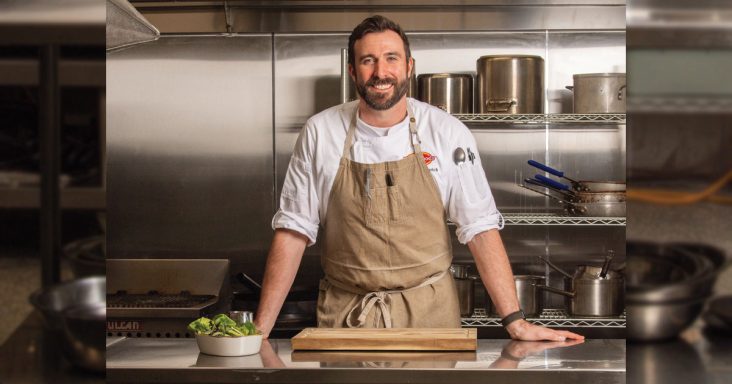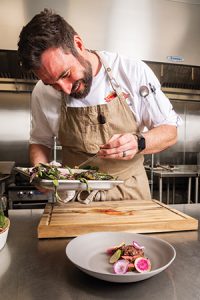Inside the kitchen with Tyson Foods chef Thomas Wenrich
by March 31, 2024 8:57 am 1,290 views

Thomas Wenrich, senior director of culinary at Tyson Foods Inc. in Springdale. (Photos by Meredith Mashburn).
Thomas Wenrich fell in love with food at age 15 while working in a small restaurant in his hometown of Hebron, Conn. As a teenager, he was hooked immediately. His family owned and operated an automotive parts store in Hebron, but Wenrich said he had no interest in working in that business.
“I love hospitality and the service of feeding people, the teamwork in the kitchen and the grunt and grind of taking these raw ingredients and turning them into a beautiful experience for someone. I fell in love with that process and knew that was what I wanted to do,” Wenrich said.
He worked in restaurants in the Northeast throughout high school and then attended Johnson & Wales Culinary School in Rhode Island. Over the next few years, he worked in restaurants and hotels in Providence. In 2008, Wenrich graduated with a bachelor’s degree in culinary nutrition, arts and chef training from Johnson & Wales. His first trip to Springdale was in 2009 for an intern position at the Discovery Center, where the company develops products for its customers. From that experience, he accepted a job as a chef with Newlywed Foods, a Tyson Foods supplier. Based in Springdale, he worked occasionally with the company’s culinary team.
In November 2012, he became a corporate chef at Tyson Foods. For the first two years, Wenrich oversaw product presentation and innovation for Tyson Foods’ foodservice business. In 2015, he became the manager overseeing research and development and a senior corporate chef. Wenrich said he oversaw everything from product R&D innovation and food manufacturing to management for the foodservice business. Then, in early 2017, he was the associate director of culinary but found himself involved in more business functions with less time in the kitchen.
Wenrich said the first six years at Tyson Foods offered him an opportunity to work with foodservice customers and manage other critical business functions, but in 2018, he left Springdale and took a similar job at Tyson’s chief poultry competitor, Pilgrim’s, headquartered in Fort Collins, Colo. He spent four and half years in Colorado overseeing product development, managing supply chain and packaging. Wenrich said it was an excellent learning opportunity, but he still longed to spend more time in the kitchen. When he had the chance to come back to Tyson Foods to head up the meat giant’s culinary business, he jumped at the opportunity, overseeing and working with 14 other corporate chefs and a diverse group of food scientists.
In August 2023, Wenrich moved his wife Megan and their young daughter back to Northwest Arkansas. Wenrich said he loves the food culture evolving around the region, but as a Northeasterner, he admits to being a pizza and pasta snob. When the couple lived here before, they both missed the pizza like they had back home. A couple of years ago, he came back for a business meeting and stumbled upon the perfect New York-style pizza at Pizzeria Ruby in Johnson, whose owner is from Boston.
Jokingly, Wenrich said he knew returning to work at Tyson was OK because he and Megan could get their beloved pizza. In seriousness, he said having the chance to head up Tyson’s culinary operations and the new leadership and innovations strategy that has put food back at the forefront of conversation was all the draw he needed to make the move.
CHEF DAY-TO-DAY
Wenrich said his duties today cover all Tyson products, from the earliest discussion of the food concept to reinforcing a popular product already garnering $1 billion in sales. His team oversees each step along the product lifecycle.
“I can see how a concept becomes a product idea and then follow it into form and evolve based on consumer needs,” he said. “Maybe it’s a perfect addition to the Ball Park brand or for Hillshire, a national restaurant chain, a small operator, or a university foodservice. We then tailor-fit those ideas to become very specialized products for their brands.”
Wenrich said that given his short tenure in this second tour with Tyson, all of the products he has worked on have yet to make it to market. However, he adds that his team members likely worked on newly added products for major retail brands. That could be like the frozen chicken sandwich sliders that were a foodservice product only, launched into retail in March 2023 or the Jimmy Dean “Egg Bites,” and a sausage, egg and cheese biscuit rollup that also came to market last year. Tyson also launched a new crispy, spicy filet, mini chicken bites and Pierre’s Philly cheesesteak melts, among dozens of other items for foodservice customers.

“When you work in a small restaurant, you might cover 40 meals a night, and I have worked for kitchens that covered 500 meals a night, but there is a limit to how many people one facility can serve,” he said. “For me, it was about the scale of the service and how many lives you can touch with food, which is magnified with this job at Tyson Foods. Also, all the learnings about food and the business I have garnered while on the job were also important to me.”
He also likes creating products and collaborating with customers to bring life to new items. Wenrich explained that much of the work his team does in the 19 test kitchens inside the Tyson Discovery Center is meeting with foodservice and retail customers to find the right products to fit customer needs and lifestyles. Wenrich said half of the team works with national retail brands, and the others work with major restaurant customers. Products conceptualized in Discovery Center could end up in fast food, casual or fine dining establishments, retail cases, schools and institutions, and entertainment venues.
Tyson’s retail business has grown since the pandemic, with more consumers choosing to eat at home, and at the same time, the foodservice business has had mixed results. Before the pandemic, Tyson typically reported retail sales comprising about 42% of revenue, with foodservice adding more than 36%, with international and industrial non-food sales making up the balance. Tyson’s retail business comprised 44% of the total revenue post-pandemic, with foodservice falling to 29% in fiscal 2022. Last year, the foodservice business recovered a little share, but Tyson’s retail business continues to gain more, according to company financials.
Wenrich said the team that works with restaurant and foodservice customers often looks for entrées to add variety or improve the quality of their menu. Likewise, he said listening to the restaurant vendor teams and sometimes tweaking a product they already have is the best solution.
“It’s an ongoing dialogue about what consumers want and how much they are willing to spend,” he said. “They trust us, and we trust them to share our insights to innovate the best possible menu for their establishments. The concepts are prototyped, revamped and deconstructed several times to ensure the end product fits the customer and 14,000 restaurant kitchens.”
Tyson defines a “culinogist” as the perfect blend of culinary art and food science who can take a recipe conceived in a test kitchen and deconstruct it to ensure it is just as delicious every single time it’s made. Because food is a sensory experience, chefs work on taste, smell, look and touch so that the product can be enjoyed with each bite.
Wenrich said his team spends more time examining customer behaviors instead of looking at food trends, as their level of food knowledge has never been higher. He said that since consumers have been cooking at home since the pandemic, they have a better understanding of regional ethnic flavors and how ingredients work together in various cooking techniques.
“One of the biggest shifts we have seen in recent years is a more educated consumer. Given that our customers know more about food than ever before, our challenge is to work to surprise and delight them,” he said.
Since returning to Tyson, Wenrich has been “focused on assembling an established and empowered team that owns their businesses and knows the trajectory of each product lane and how they can best maximize the benefits for customers.” He emphasized how integral the partnerships between restaurant and retail customers are because they all serve the same end customers. Wenrich said his team plans to load the product pipeline over the next several months with new and improved food items that eventually make their way to market.
Wenrich said food connects people, and it makes perfect sense for Tyson Foods to participate in community efforts centered around food. His team is involved in various community efforts, such as judging events at Brightwater: A Center for the Study of Food in Bentonville, auctioning off dinners for local charities and even hosting college culinary students on campus for a weekend to discuss food and the careers possible in Tyson’s culinary and food businesses.
“We want to stay connected and support the local community and Brightwater. Some people in this building were hired from the Brightwater program, and while they have not yet made it to my team, we continue to foster that relationship and support that community here,” he said.
Megan Wenrich works in research and development for an adult beverage company. Wenrich said they make the perfect food and beverage team and are happy to raise their daughter in Northwest Arkansas.
